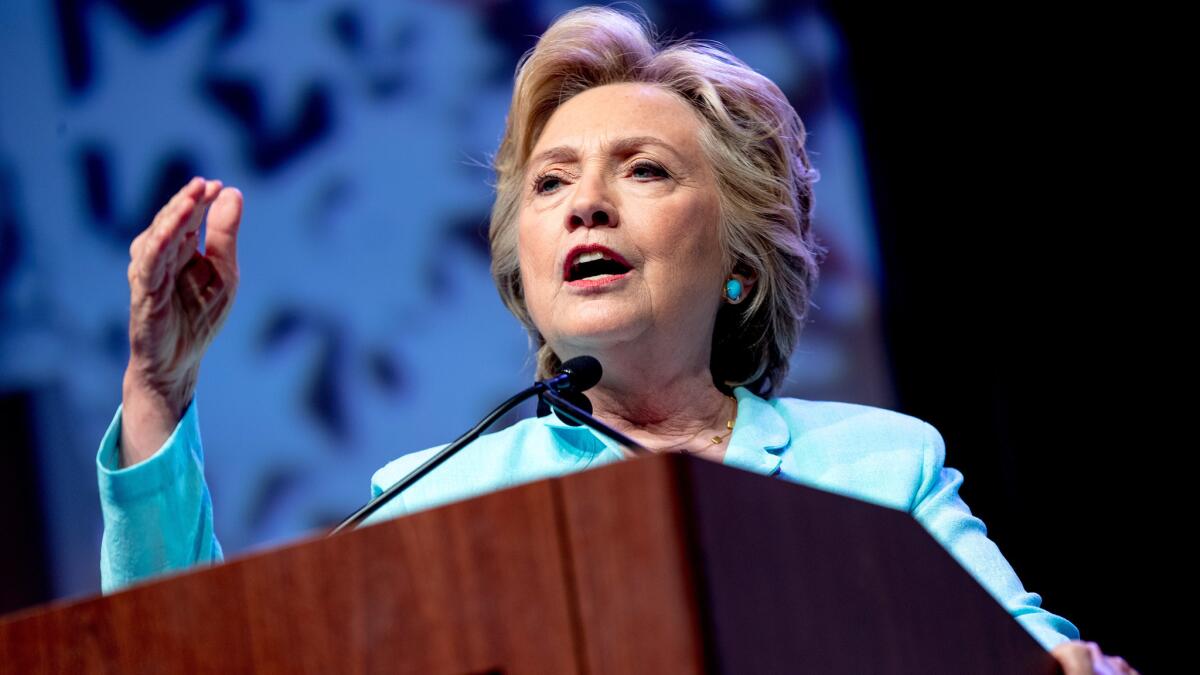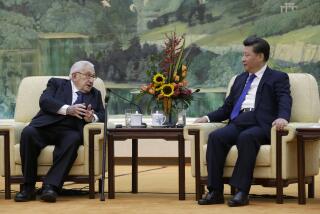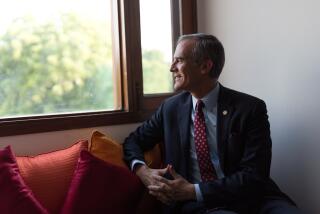Hillary Clinton won praise as America’s top diplomat, but time has tarnished her record

Hillary Clinton’s service as America’s third female secretary of State produced few dramatic diplomatic initiatives but was generally highly regarded by foreign policy experts when she stepped down nearly four years ago.
Now the scandal over Clinton’s use of a private email server while at the State Department, plus a partisan clash over her response to the 2012 Benghazi attack and the relentless wear-and-tear of global crises, have overshadowed her achievements and could undermine a pillar of her presidential campaign.
After losing her first White House bid in 2008, Clinton became the top U.S. diplomat during President Obama’s first term. She joined a powerful team of rivals who debated and advocated policies inside the White House.
By most accounts, Clinton had Obama’s ear on critical issues and helped bring professionalism back to a diplomatic corps that was often demoralized under President George W. Bush.
“The first Obama term was much more successful in terms of foreign policy than the second,” said Walter Russell Mead, a foreign policy scholar who edits the American Interest, a publication of political commentary, and is not involved in the campaign.

History: Hillary Clinton’s full speech accepting the Democratic nomination for president. More coverage at latimes.com/trailguide or read The Times’ annotations of her speech at latimes.com/clintontranscript
“But because things have not gone as hoped, while the world got in worse shape, it is harder to talk about [Clinton’s] legacy,” Mead said.
One reason, perhaps, is that like Bush, Obama has conducted some crucial foreign policy operations from the White House.
Clinton thus was not the lead decision-maker in key peace efforts. Her plan to appoint special envoys to handle the Middle East, Afghanistan and Pakistan in early 2009 came to naught when the diplomats were either marginalized or overridden by the White House.
Although Clinton’s supporters insist her work helped pave the way, the intense negotiations that led to a historic nuclear arms control deal with Iran last year, which arguably will be Obama’s major foreign policy legacy, began after she left office.
Moreover, some of Clinton’s gains overseas, such as restoring diplomatic relations with the shaky democracy in Myanmar (also known as Burma) after decades of isolation, have faded. The government in Yangon is still accused of regular human rights abuses.
Even what once seemed like major victories — the 2011 ouster of longtime despots in Egypt and Libya, for example — have been lost in the wave of violence and chaos sweeping the Middle East.
For his part, Obama has called Clinton — a former secretary of State, former U.S. senator from New York and former first lady — the most qualified candidate ever to run for the White House.
Among the highlights of her tenure, Obama has said, were her counsel and calm in the Situation Room before Obama made the decision to launch the raid in Pakistan that killed Osama bin Laden in May 2011.
Clinton’s icy focus on detail — a trait she sometimes self-mocks on the campaign trail — was a plus during national security crises.
“She was always in command of her brief,” said Dennis Ross, a veteran diplomat who served under four presidents, including two years as Obama’s special assistant for the Middle East..
“She rarely took anything at face value. … The president would turn to her and she would outline all the issues at stake,” said Ross, now a distinguished fellow at the Washington Institute for Near East Policy, a nonpartisan think tank.
Experts say Clinton oversaw the negotiations with Russia that led to the New START Treaty to reduce strategic offensive nuclear weapons. She also is credited with putting climate change and women’s rights high on the new administration’s agenda.
Clinton also championed Obama’s 2011 call for a strategic and economic “pivot” to Asia and the Pacific Rim, and she supported the Trans Pacific Partnership, an ambitious 12-nation trade deal then being negotiated.
She also advocated resetting troubled relations with Russia, even giving Russia’s foreign minister a red button marked “Reset” in March 2009.
The pivot appeared prescient — or provocative — when China began building up islands in the South China Sea that are also claimed by other countries, a regional dispute that is still unfolding.
Last October, as a presidential candidate, Clinton withdrew her support for the TPP, saying the final draft did not meet her standards for creating new jobs and “raising wages for Americans.”
And the “reset” with Russia went nowhere once Vladimir Putin was elected president in 2012 and asserted a muscular Russian nationalism that put him at odds with numerous U.S. policies.
Michael O’Hanlon, a national security expert at the Brookings Institution who has advised Clinton, judged her State Department record “more solid than spectacular” when she left office in 2013.
He stands by that assessment but says some of her efforts have borne fruit that was not discernible then, such as the pivot to Asia and attention given to climate change.
Other issues continue to haunt her campaign, however.
Donald Trump, the GOP presidential nominee, has hammered Clinton for her handling of the 2012 attack on a U.S. diplomatic mission and nearby CIA post in Benghazi, Libya, that left a U.S. ambassador and three other Americans dead in September 2012.
On June 22, Trump said Clinton’s decisions as secretary of State “spread death, destruction and terrorism everywhere she touched. Among the victims was our late Ambassador Chris Stevens. I mean, what she did with him was absolutely horrible. He was left helpless to die as Hillary Clinton soundly slept in her bed. That’s right. When the phone rang, as per the commercial, at 3:00 in the morning, Hillary Clinton was sleeping.”
Actually, the attack occurred at 3:30 p.m. in Washington, and records show Clinton was at her desk. And none of the numerous congressional investigations have faulted Clinton for her actions that day, or concluded she could have done something different that would have saved lives.
Foreign policy experts are more critical of the administration’s failure to help stabilize Libya after a U.S.-led NATO air war helped militants oust strongman Moammar Kadafi in 2011. The ensuing chaos led to Benghazi and the turmoil that sill engulfs the North African nation.
More damaging is the still-unfolding scandal over Clinton’s use of a private email server while she was in office.
The FBI closed its investigation without recommending criminal charges, but Clinton can look forward to the release this fall of further emails that critics say show she lied, a charge she denies.
Unable to shed those controversies, the Democratic nominee has focused more on the economy and other domestic issues on the campaign trail. She has only given one speech that her aides billed as a major foreign policy address.
Speaking June 2 in San Diego, she focused on Trump, calling her Republican rival “temperamentally unfit to hold an office that requires knowledge, stability and immense responsibility,”
Clinton has described her foreign policy philosophy as both inclusive and outward-looking due to the optimistic outlook she absorbed with her Methodist upbringing. Her aides say she is proud of her record.
“I worked to reorient American foreign policy around what I call ‘smart power,’ “ Clinton wrote in her 2014 memoir, “Hard Choices.”
“To succeed in the 21st century,” she wrote, “we need to integrate the traditional tools of foreign policy — diplomacy, development assistance, and military force — while also tapping the energy and ideas of the private sector and empowering citizens, especially the activists, organizers, and problem-solvers we call civil society.”
For more on foreign policy, follow @TracyKWilkinson on Twitter.
MORE POLITICS NEWS
Before Trump, Americans hadn’t worried this much about nuclear weapons since the Cold War
New poll analysis finds a wasted summer for Donald Trump and a boost for Hillary Clinton
When it comes to Trump, GOP senators battling for their seats are used to contortions
More to Read
Get the L.A. Times Politics newsletter
Deeply reported insights into legislation, politics and policy from Sacramento, Washington and beyond. In your inbox three times per week.
You may occasionally receive promotional content from the Los Angeles Times.







